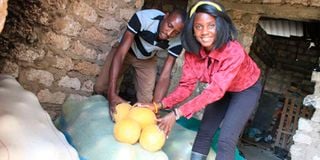Sweet money for mother and daughter growing melons

Prisca Charo and their worker, Stephen Musyoka, weigh sweet melons on their farm in Kwale County.
What you need to know:
- The crop requires plenty of water, therefore, the family dug a borehole at a cost of Sh150,000 for a constant water supply.
- If well-taken care of, the plants start producing fruits in about eight weeks, and they will then change from green to bright yellow. Harvesting continues for over two months.
- They sell them at Marikiti market in Mombasa at Sh80 each. The melons weigh between 2.3 and 2.85 kilos each.
The lush green sweet melon crops on a half-acre farm in Patanani village, Kwale County, catch the attention of many as they walk or drive past.
Seeds of Gold team finds Prisca Charo, 28, the farmer behind the wonder crop, on the farm at 7.30 am supervising some workers harvesting the produce.
Prisca says she chose to grow the crop after being inspired by her mother, Euniter Amolo Charo, a lawyer at the Communication Authority of Kenya.
“My mother loves melons. One day after eating one of them, she asked me whether we can grow them on the farm, and this is what made me start the venture,” she says.
Through support from her mother, Prisca invested Sh201,500 into the business in 2019, money that went on a water pump, seeds, fertiliser, tilling land and irrigation kits.
She oversees activities on the farm as well as market the produce.
“I travel from Nairobi every weekend to check on the activities on the farm and then share with my mother. I can say it is a mother-daughter venture,” explains the 2018 Bachelor of Arts in International Relations and Security Studies, Daystar University graduate.
According to Prisca, they grow the Galia variety of sweet melons.
The crop requires plenty of water, therefore, the family dug a borehole at a cost of Sh150,000 for a constant water supply.
“Through Ufanisi Cooperative Society, where we are members, we also dug a water pan where we store more water.”
To plant the melons, Prisca says the land should be prepared to a fine tilth, holes made and seeds sowed.
“For this season, we prepared the land in March and then bought the Sweet melon Galia F1 variety in a 100g pack at Sh4,200 and planted them using DAP fertiliser at a spacing of 6 feet between plants and 6 feet from one row to the next,” she explains.
If well-taken care of, the plants start producing fruits in about eight weeks, and they will then change from green to bright yellow. Harvesting continues for over two months.
“For faster maturity, they need foliar fertiliser and spraying to curb pests and diseases. This should be done sometimes weekly,” says Prisca, noting the crops should be watered daily in the initial stages and thrice a week later.
Challenges
One of the challenges of growing sweet melons in Patanani, says Prisca, is monkey invasion.
The animals sneak from Shimba Hills National Reserve.
The fruits are also attacked by cutworms, grasshoppers and rats.
“The leaves are affected by diseases such as blight and powdery dew,” she says, adding they have employed one worker permanently and hire more on a need basis, especially during harvesting.
From the quarter-acre that they are currently harvesting, Prisca says they have so far picked 1,336 kilos, 818 kilos during the first harvest and 518kg in the second.
They sell them at Marikiti market in Mombasa at Sh80 each. The melons weigh between 2.3 and 2.85 kilos each.
“There is a ready market for the fruits since few farmers grow them,” she says, adding she is expecting to harvest more fruits in the coming weeks.
Euniter says she decided to support her daughter because of the interest they shared in agribusiness.
“Before we started, Prisca went for a training in agribusiness at Pwani University to get the right knowledge.”
Euniter adds that they have begun to increase the acreage of sweet melons as demand in hotels rises.
The fruits control blood sugar level, keeps the skin healthy, boosts immunity and promotes digestion.
Finyange Pole, a researcher at the horticulture department, Kenya Agriculture and Livestock Research Organisation Matuga station in Kwale County, says for maximum production of sweet melons, the farmer should adhere to the crop’s master spray guide.
“Sweet melon normally attracts pests like grasshoppers and cutworm that needs to be managed. The cutworm is found in the soil and thus can destroy the entire crop if unchecked,” Pole says.





